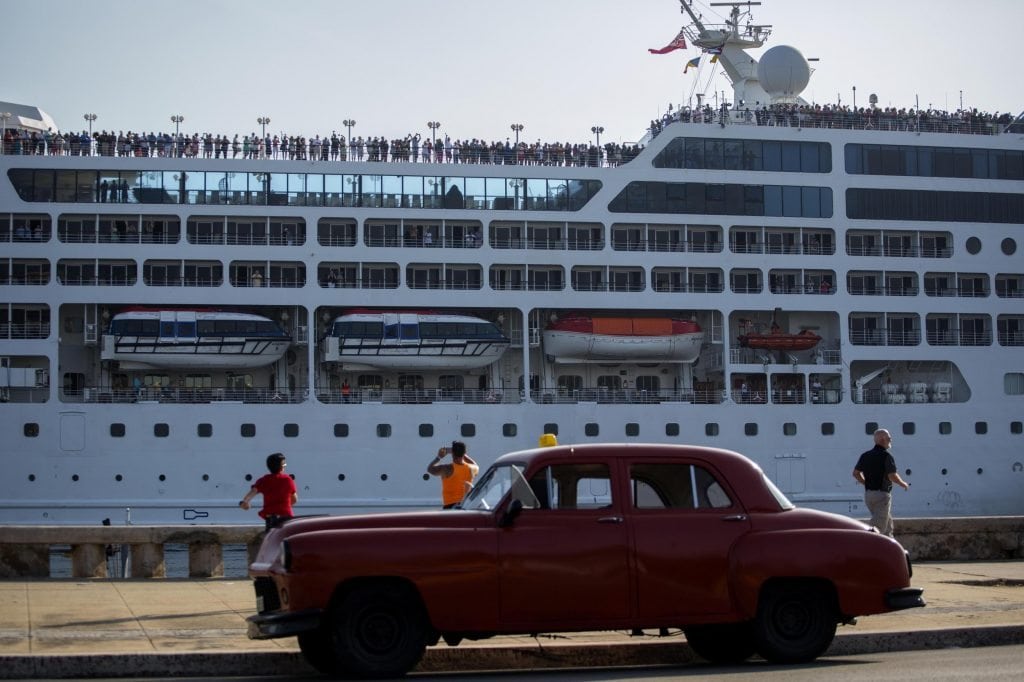Skift Take
Will Americans' rediscovery of Cuba be curtailed before it really takes off? There are already enough uncertainties about visiting the island with the embargo, tight hotel supply, and limited infrastructure on the ground. Adding more red tape could have a big impact.
More than a year after the U.S. government announced measures to make travel to Cuba easier for Americans, President Donald Trump may roll back some of those moves, according to media reports.
No new policy has been announced and the extent of any tightening on travel is not clear — or possibly even fully determined yet. In a story posted Wednesday night, The New York Times said Trump is still mulling how far to go in reversing the changes President Barack Obama’s administration introduced.
According to the Times and CNN, the practice of allowing travelers to simply declare their reason for visiting may be at risk. Americans aren’t permitted to visit the island as tourists but must go under one of a dozen approved categories. Most go for cultural purposes and have to choose that as their reason on a form.
But unlike earlier years, Americans no longer need to go with an approved tour group or receive prior approval from the government.
President Trump ran a global hospitality company before taking office and should understand the potential impact of rolling back regulations, said James Williams, president of Engage Cuba, a D.C. nonprofit that works with private companies including travel brands and associations to push Congress to end travel restrictions and the trade embargo on Cuba.
The organization released an analysis Thursday that said reversing policies that made travel easier could cost U.S. airlines and cruise lines as much as $3.5 billion and more than 10,000 jobs through 2021.
Several news outlets have reported that the government may crack down on U.S. companies doing business with Cuban military-related businesses. Last year, Starwood — which has since been acquired by Marriott — started managing a hotel owned by the Cuban military; it is not clear how that deal would be affected.
Marriott did not respond to questions from Skift.
Also unclear is whether U.S.-based cruise lines, which have scheduled Cuba sailings through 2019, would have to change anything about their business on the island. The first Miami-to-Havana cruise in decades happened last year, but operators have been steadily building their presence in Cuba this year.
Representatives from cruise operators had little to say on any potential impact Thursday. A Royal Caribbean spokeswoman declined to speculate on whether travel regulations could change.
Norwegian Cruise Line spokeswoman Vanessa Picariello said in an email that the company is operating under regulations that are currently in place.
“Should something change in the future, we will make the necessary arrangements, but today, we remain focused on this new offering in the Caribbean that our guests booked to sail on future cruises to Cuba are very much looking forward to experiencing,” she said.
At Carnival Corp., which sent the first ship from Miami to Cuba last year, plans still call for increasing the number of sailings to the island.
“We were honored and humbled to be able to be the first cruise line from the U.S. to sail to Cuba in more than 40 years,” chief communications officer Roger Frizzell said in an email. “A year later, we now have two more of our lines scheduled to sail to Cuba, and we are hopeful to provide the offering on other lines. It is an extraordinary experience for our guests that helps refresh our Caribbean itineraries.”
At a conference in March, executives were more openly concerned that the Trump administration might make changes that would hurt them.
Frank Del Rio, president and CEO of Norwegian Cruise Line Holdings, said he hoped to see the embargo lifted altogether.
“It can be a major force in the cruise business for years to come,” he said. “I hope the administration sees that potential….and therefore would hesitate to roll back any of the Obama-era initiatives.”
Cruise line enthusiasm aside, the influx of American visitors to Cuba has not been as robust as expected.
“A lot of these other cities that U.S. airlines can now fly to are near beaches which would be packed if Americans could go there as tourists,” said Williams, the Engage Cuba president. “Part of this is oversaturation but now I think we’re seeing the market correct itself and brands pushing the Havana market. That’s what U.S. travelers want right now.”
Several airlines have cut back their service to the island or ended it altogether due to weaker-than-expected demand. American Airlines is the largest U.S. carrier to Cuba with 10 daily flights, including four from Miami to Havana. It has flown to Cuba since 1991, though it operated only charter flights for the first 25 years.
“We can’t speculate on what the administration may do but we are proud to be the leading carrier between the U.S. and Cuba,” American Airlines spokesman Matt Miller said.
Any crackdown on Cuba would not be entirely unexpected, but details have been vague. After the election, Trump warned in a tweet: “If Cuba is unwilling to make a better deal for the Cuban people, the Cuban/American people and the U.S. as a whole, I will terminate deal.”
A review of Cuba policy by the administration is expected to be finished this month.
Skift hospitality editor Deanna Ting, tourism reporter Dan Peltier, and airline business reporter Brian Sumers contributed to this report.
The Daily Newsletter
Our daily coverage of the global travel industry. Written by editors and analysts from across Skift’s brands.
Have a confidential tip for Skift? Get in touch
Photo credit: The Adonia cruise ship arrives in Havana from Miami in Ma 2016. Cruise lines have built up their presence in Cuba, but the Trump administration is mulling whether to tighten restrictions on travel with the country. Desmond Boylan / Associated Press
